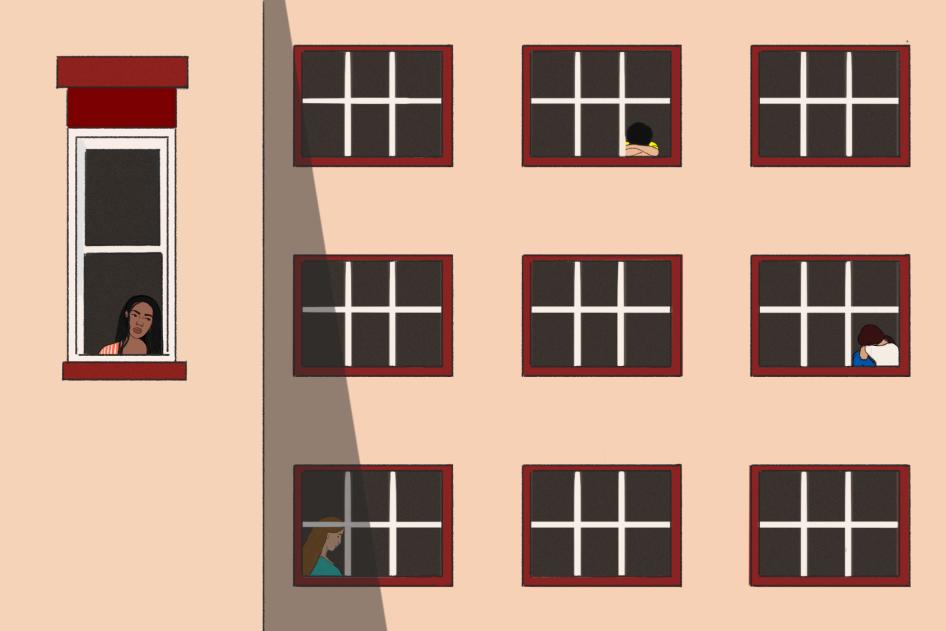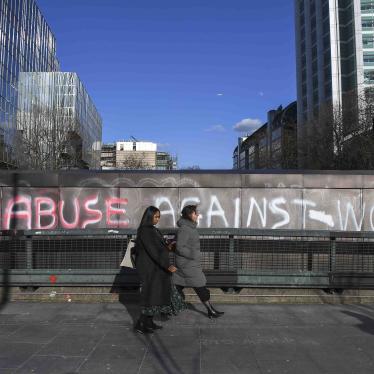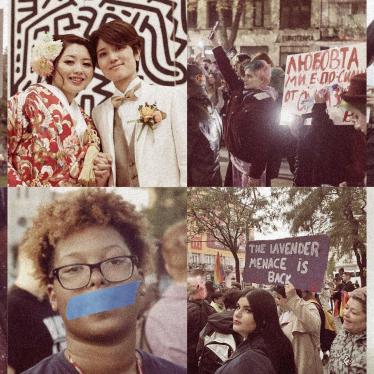(New York) – Governments need to do more to monitor and intervene to prevent violence against women during Covid-19 lockdowns, Human Rights Watch said today in a report to the United Nations special rapporteur on violence against women. The problem may be especially acute for women who face both discrimination and marginalization.
Human Rights Watch raised concern that domestic workers, older women, women with disabilities – including those living in institutional settings – and women without access to technology, working remotely from home or facing a precarious housing situation, may find it harder to get urgently needed services during the pandemic. The 17-page report details steps governments should take to ensure that no woman is left out in government responses to increased violence.
“Authorities everywhere should be worried about reports of rising gender-based violence in the context of the Covid-19 pandemic and associated lockdowns,” said Amanda Klasing, acting co-director of women’s rights at Human Rights Watch. “Reports of increases in gender-based violence mask a larger risk that women in the shadows or margins of society will suffer violence without remedy or reprieve if governments don’t act quickly.”
Dubravka Šimonović, the UN special rapporteur, highlighted in her March 27, 2020 statement that efforts to deal with the current health crisis may lead to an increase in domestic violence against women. Human Rights Watch has also raised concerns that crises – and lockdowns – can trigger a greater incidence of domestic violence for reasons including increased stress, cramped and difficult living conditions, and breakdowns in community support systems. Crises can also often further limit women’s ability to escape abuse and see their abusers held to account, and place victims in an environment without appropriate access to services, such as safe shelters.
Initial reporting from police complaints and hotline data from countries around the world suggests that the fears of the special rapporteur and Human Rights Watch are well-founded. Accordingly, it is critically important for the authorities to consider domestic violence services essential during lockdowns and to ensure that no new barriers to accessing services are created, Human Rights Watch said.
Human Rights Watch provides details of how governments can do more to reach women marginalized because of their employment, age, disability, limited access to the internet, working from home, or precarious housing situations. Not all women have been hit equally by the Covid-19 pandemic and associated economic crisis. In many countries, women from already marginalized communities find themselves on the front line as essential workers, with a more precarious financial situation as informal workers, or facing unaddressed institutional racism and health disparities. All of this makes accessing services for gender-based violence more difficult.
Government policies related to violence against women and family violence should be inclusive of, and accessible for, women with disabilities and older women, Human Rights Watch said. As many older women are also at heightened risk of complications related to contracting Covid-19, they are in a particularly precarious situation, depending on support from others for activities like going to the grocery store or bank.
Many women living in residential institutions face risk of neglect, abuse, and inadequate health care, but also restrictions on their legal capacity, which take away their rights to make decisions for themselves. As recent Human Rights Watch research in Mexico demonstrates, women with disabilities may also face abuse when they live with family members – particularly women who need intensive forms of support for daily tasks and basic needs, such as housing, food, and hygiene. Governments should collect comprehensive data on violence against older women and women with disabilities, particularly as the pandemic crisis continues.
The internet can facilitate access to survivor support groups, counseling, health information – including about sexual and reproductive health – and other online resources that can be critical lifelines to women experiencing gender-based violence. However, the global digital divide can also be a barrier to accessing services in the context of the pandemic and lockdown, Human Rights Watch said.
In low and middle-income countries, over 300 million fewer women than men are using the mobile internet. And women from marginalized communities, including older women and women with disabilities, in all countries may experience disproportionate exclusion from access to the internet.
In one example, service providers who respond to gender-based violence in the United Kingdom told Human Rights Watch that as resources go digital, the Covid-19 crisis has exacerbated a lack of access to services for migrant and Black, Asian, and minority ethnic women. Governments should ensure that, as more services move online to reach women during Covid-19 lockdowns, women without access to safe, private internet or mobile resources can continue to access services.
Women who work in homes, including domestic workers who live with their employers or women now telecommuting from home, may face particular risks of abuse without being readily visible to policymakers or service providers. Employers should be made aware of the role they can play in facilitating access to support services and taking steps to prevent abuse that results in job loss, Human Rights Watch said. The groundbreaking 2019 International Labour Organization Violence and Harassment Convention specifically obliges governments to recognize and mitigate the impacts of domestic violence on work, and governments should move toward ratification and implementation of the convention.
“The public health and economic impact of the pandemic continues, but governments have a clearer picture of additional risks and damage caused by lockdowns,” Klasing said. “They need to step in quickly and address the rising risks of violence. Any response will be incomplete unless governments ensure that their efforts specifically target women already largely forgotten by authorities, even before the crisis.”








